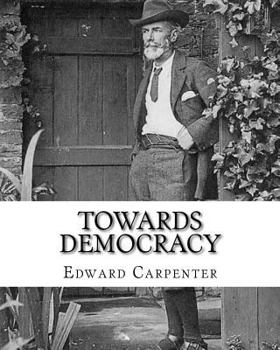Towards democracy By: Edward Carpenter: Edward Carpenter (29 August 1844 - 28 June 1929) was an English socialist poet, philosopher, antholo
Select Format
Select Condition 
Book Overview
Edward Carpenter (29 August 1844 - 28 June 1929) was an English socialist poet, philosopher, anthologist, and early activist for rights for homosexuals. A poet and writer, he was a close friend of Rabindranath Tagore, and a friend of Walt Whitman. He corresponded with many famous figures such as Annie Besant, Isadora Duncan, Havelock Ellis, Roger Fry, Mahatma Gandhi, Keir Hardie, J. K. Kinney, Jack London, George Merrill, E. D. Morel, William Morris, Edward R. Pease, John Ruskin, and Olive Schreiner. As a philosopher he was particularly known for his publication of Civilisation, Its Cause and Cure in which he proposes that civilisation is a form of disease that human societies pass through. An early advocate of sexual freedoms, he had an influence on both D. H. Lawrence and Sri Aurobindo, and inspired E. M. Forster's novel Maurice. Early life: Born in Hove in Sussex, Carpenter was educated at nearby Brighton College where his father was a governor. His brothers Charles, George and Alfred also went to school there. When he was ten, he displayed a flair for the piano. His academic ability appeared relatively late in his youth, but was sufficient to earn him a place at Trinity Hall, Cambridge. Whilst there he began to explore his feelings for men. One of the most notable examples of this is his close friendship with Edward Anthony Beck (later Master of Trinity Hall), which, according to Carpenter, had "a touch of romance". Beck eventually ended their friendship, causing Carpenter great emotional heartache. Carpenter graduated as 10th Wrangler in 1868.After university he joined the Church of England as a curate, "as a convention rather than out of deep Conviction". In 1871 he was invited to become tutor to the royal princes George Frederick (late King George V) and his elder brother, Prince Albert Victor, Duke of Clarence, but declined the position. The job instead went to his lifelong friend and fellow Cambridge student John Neale Dalton.Carpenter continued to visit Dalton while he was tutor, and was presented with photographs of themselves by the princes. In the following years he experienced an increasing sense of dissatisfaction with his life in the church and university, and became weary of what he saw as the hypocrisy of Victorian society. He found great solace in reading poetry, later remarking that his discovery of the work of Walt Whitman caused "a profound change" in him. (My Days and Dreams p. 64)............
Format:Paperback
Language:English
ISBN:1720663076
ISBN13:9781720663072
Release Date:June 2018
Publisher:Createspace Independent Publishing Platform
Length:160 Pages
Weight:0.85 lbs.
Dimensions:0.3" x 8.0" x 10.0"
Customer Reviews
2 ratings
England's Walt Whitman
Published by Thriftbooks.com User , 23 years ago
There are certain people and particular pieces of literature that belong to the fabric of man's truest nature. This book, like "Leaves Of Grass" and "Walden" and Emerson's essays, belongs in that category. This is one of those books that are for those quiet moments when the inner space within needs nourishment. Carpenter is the type of man I long to talk to. He understands the fundamentals of the human experience. He is very different than W.W. yet very similar. W.W.'s poetry is more to my liking but Carpenter's temperament and perspective makes W.W. more poignant and relevant. Very powerful lives and natures entangled in the cosmic dance of life. They compliment one another. This is a book to be sipped and savoured in the quiet moments at either the beginning or end of one's day.
Possibly the most comprehensive book on the human condition
Published by Thriftbooks.com User , 24 years ago
This is quite possibly the most comprehensive book ever written on the human condition, be it the dawn of the 20th century (when the book was written) or the dawn of the 21st century.This book sadly fell out of print a few years ago, and I am so happy that it is once again available and able to enlighten a whole new generation. Edward Carpenter was a turn-of-the-century poet and philosopher who collected his works into this magnificent volume. He writes about democracy, not in the political sense, but in the social sense. Writing on equality, love, hope and the need to express one's sense of joy in a world that holds so much, Carpenter opens the mind and heart to the true issues that are fundamental to all people. Carpenter's poetry and prose are inspirational and true to everyone's life, regardless of class, color or creed. He truly celebrates life the way it should be celebrated. A glorious tour-de-force, Towards Democracy is a book I would recommend to anyone and everyone.I was given this book in 1991 by a friend as a going away (to college) gift. I was going through many changes in my life, and facing massive depression because of them. He gave me the book after turning to a passage that directly related to my situation, and I have read it no less than five times cover-to-cover. I believe that fate sent him to that book, and in turn, brought it into my life.Any time I feel down-trodden or unable to focus on what is really important in my life, I read a little. It never fails to help. I have shared this book with friends, and they all think it is one of the most brilliant and eloquent books they've read.Don't get me wrong, this is not a book centered on religion, and many of the essays are descriptions of places Carpenter's seen. However, it is his unique vision of the world, his wonderful prose and immense respect of life that make this a book that belongs in every library.





